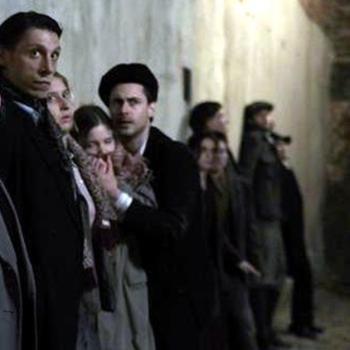 After four episodes of TNT’s “Will,” premiering Monday, July 10, I’m sighing, rolling my eyes and wondering if I should just give up.
After four episodes of TNT’s “Will,” premiering Monday, July 10, I’m sighing, rolling my eyes and wondering if I should just give up.
(The show launches with two episodes, the first of which is available online.)
But, I’ve learned from HBO’s “The Young Pope” that it might be worth it to hang in with a Catholic storyline done by a secular writer. Whether they mean to or not, sometimes the demands of drama and the natural instincts of a writer will lead them to stumble over the truths of the Faith.
This one might get there, if it can get out of its own way.
The 10-episode creation of Craig Pearce, Baz Luhrmann’s longtime writing partner, is an aggressively anachronistic look at the life of young William Shakespeare, tarted up with punk costumes, mosh pits, tattoos, multicolored hair and pop music. No doubt this is to appeal to the young folks, but it also allows for multicultural casting, which is fine in this context.
Where “Will” really diverges from the similar “Shakespeare in Love” is asserting that the Bard of Avon is definitely Catholic and has a cousin, Robert Southwell (Max Bennett), who’s a fugitive priest. (In real life, poet Percy Shelley, not Shakespeare, may be the writer with a family connection to Jesuit Father Southwell, but Southwell and Shakespeare may have read and been influenced by each other’s work.)
Leaving behind his wife and three children at home (which Shakespeare did), young Will, played by doe-eyed newcomer Laurie Davidson, heads to London. At the behest of his devout parents, he’s carrying a rosary and a secret letter to Southwell, which could get him in trouble with Protestant Queen Elizabeth’s spies and torturers, led by Richard Topcliffe (Ewan Bremner) — who really enjoys his work.
Elizabethan London is reimagined as a thee-and-thou-flavored combination of Burning Man, a Renaissance Faire and a Pride Parade, populated by famous names from history that have wildly varying degrees of verisimilitude.
After some misadventures, Shakespeare falls into a company of players at a theater whose owner, James Burbage (Colm Meaney). has an airheaded actor son, Richard (Mattias Inwood), and a headstrong daughter, Alice (Olivia DeJonge).
In Shakespeare’s orbit is rival playwright Christopher Marlowe (Jamie Campbell Bower), who slinks around like the test-tube offspring of David Bowie and Freddie Mercury. He engages in all kinds of wild sexual escapades (entirely gay ones, as near as I can tell), which do nothing to relieve his perpetual cranky pout and apparent writer’s block.
At the same time, Marlowe is one of Topcliffe’s agents, or perhaps a double agent — it’s hard to tell (by the way, this is not Pearce’s invention, it’s for real).
Will doesn’t succumb to Marlowe’s attentions, but despite taking advantage of Confession with his cousin, his attempts to remain faithful to his wife seem halfhearted at best. Obviously, he has not internalized the heroism of Katherine of Aragon, who risked everything to remain true to her Catholic vows to Henry VIII.
Before long, Will’s letting fame go to his head, and he no longer wants to help Southwell continue the fight to restore the Catholic faith to England.
So, we have a flood of hedonism submerging the very interesting notion that Shakespeare was actually a serious Catholic, which put him in peril of his life (despite some TV reviewers who insist that Elizabeth I was not really into religious persecution, which would come as news to the Irish, among others).
One would think, after decades now of watching musician after actor after writer succumb to drugs, drink, disease and suicide, this romance with decadent lifestyles would start to wear off — yet, no.
(For instance, the death of 39-year-old “True Blood” star Nelsan Ellis during alcohol withdrawal after years of drug and alcohol abuse is a case in point.)
Also, “Will” seems to think that showing same-sex kissing is still daring and transgressive. But since anyone watching cable drama (and even the occasional network drama) sees this sort of thing with increasing frequency these days, it’s hardly envelope-pushing.
While there’s no full nudity, there’s a lot of partial, and the odd swear word — which is also the new normal for several advertiser-supported cable networks.
Honestly, the most underdeveloped and potentially interesting character is Southwell, who’s portrayed as iron-jawed and humorless. But having Will, steeped in sin and dishonesty, complaining to Southwell that his stiff-necked attitude won’t lead to peace rings pretty hollow.
The show also likes to portray Alice as a woman before her time, a proto-feminist, if you will. But given the realities of the age, all her escapades are likely to get her is a future in grinding poverty and possibly prostitution. While other female characters in “Will” face this harsh reality, Alice bounces along in some sort of alternate universe of 21st Century you-go-girl-ism.
What might be really interesting is for Will to not just say he has faith, but act like he does. Heaven knows what the real Shakespeare got up to in London, far away from hearth and home, but the notion of the bad boy has gotten really old. I’d rather see a man somehow resist temptation, despite intense pressure on all sides to give in, and not be portrayed as a sour-faced prude at the same time.
But, like I said up top, storytelling miracles have happened, so I might give “Will” a few more episodes before yielding the field and just watching Kenneth Branagh’s “Henry V.”
BTW, here’s Catholic writer Joseph Pearce (no relation to Craig Pearce, as far as I know), explaining why he also thinks that Shakespeare was a secret Catholic:
And, here’s Bishop Barron’s thoughts on the matter:
Image: Courtesy TNT
Don’t miss a thing: head over to my other home, as Social Media Manager at Family Theater Productions; and check out FTP’s Faith & Family Media Blog.

















